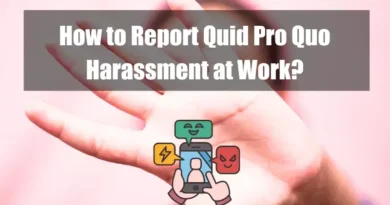Social Effects of Quid Pro Quo Harassment
Takeaways
| Key Points |
|---|
| Quid pro quo harassment has significant social consequences in the workplace, leading to the erosion of trust and morale, as employees may feel unsafe and unsupported when such behavior goes unaddressed. |
| It also causes social fragmentation, as teams break apart into cliques based on their perceptions of the harassment, undermining collaboration and communication. |
| Peer relationships are strained, with employees becoming focused on self-preservation, resulting in a toxic environment, while victims often face marginalization, social exclusion, and isolation, especially when they report the harassment. |
| Public perception of harassment incidents also harms victims’ reputations, as they may be blamed or socially labeled as weak, while perpetrators may face negative social consequences, making it essential to promote understanding and support. |
| Additionally, the harassment reinforces harmful gender stereotypes, impacts gender relations by creating distrust, and poses social barriers, especially for women, limiting their career and social opportunities, thus highlighting the need for workplace initiatives that foster equality and inclusivity. |
Introduction
Quid pro quo harassment, a form of workplace sexual harassment, occurs when an individual is coerced into unwelcome sexual behavior in exchange for employment benefits or the avoidance of negative consequences. While the legal implications of this type of harassment are often highlighted, the broader social effects are equally significant.
These effects extend beyond the immediate victim and perpetrator, impacting workplace dynamics, public perceptions, and societal norms. The repercussions of quid pro quo harassment can permeate every level of social interaction, causing lasting damage to trust, relationships, and community cohesion.
Impact on Workplace Social Dynamics

Erosion of Trust
One of the most profound social impacts of quid pro quo harassment is the erosion of trust within the workplace. When such harassment occurs, particularly if it goes unaddressed, employees may lose confidence in the integrity of their workplace and its leadership. This loss of trust can lead to a breakdown in workplace morale, where employees feel unsupported and unsafe.
Organizations must implement transparent anti-harassment policies to rebuild trust and ensure all employees understand that harassment will not be tolerated. Leadership should actively model ethical behavior and enforce accountability measures to foster a culture of respect and trust within the organization.
Social Fragmentation
Quid pro quo harassment can create deep divisions within a workplace, leading to social fragmentation. Employees might form cliques or align themselves based on their perceptions of the harassment incident, further exacerbating tensions and undermining workplace cohesion. This fragmentation can make it difficult for teams to collaborate effectively as trust and communication break down.
Organizations should encourage open communication and foster a collaborative environment to combat social fragmentation. Team-building activities and conflict-resolution initiatives can help mend divisions and restore a sense of unity within the workplace.
Peer Relationships
Quid pro quo harassment can severely strain colleagues’ relationships. The fear and tension it creates can discourage collaboration, as employees may become more focused on protecting themselves than working together. This shift can lead to a toxic work environment where mistrust and hostility are normal. Mediation and conflict resolution services can help address these tensions and repair damaged relationships.
Organizations can mitigate the negative impact of harassment on peer relationships by encouraging a supportive and cooperative workplace culture.
Marginalization of Victims
Victims of quid pro quo harassment often face social exclusion and isolation, particularly if they choose to report the incident. This marginalization can have severe consequences for their mental health and career prospects, as they may be ostracized by their peers and viewed as troublemakers.
To support victims, organizations should create safe spaces where they can share their experiences without fear of retaliation. Employers should also ensure that those who report harassment are protected and supported throughout the process, helping them regain their social standing and continue their careers without stigma.
Social Stigma and Public Perception

Victim Blaming
A significant social consequence of quid pro quo harassment is the tendency to blame the victim rather than the perpetrator. This societal reaction can further damage the victim’s reputation and contribute to their isolation. Victim blaming not only exacerbates the trauma experienced by the victim but also perpetuates a culture that condones harassment.
Educational campaigns aimed at shifting the narrative away from victim-blaming and toward supporting survivors are essential. By promoting a culture of empathy and understanding, organizations and communities can help reduce victims’ stigma and encourage more individuals to come forward with their experiences.
Reputation Damage
Once an incident of quid pro quo harassment becomes public, victims’ social and professional reputations can be severely damaged. This can lead to long-term consequences, including difficulties securing future employment and maintaining social relationships.
Public recognition of the victim’s courage in coming forward and implementing policies that protect and support their reputation are crucial steps in addressing this issue. Organizations should take active measures to ensure that victims are not further harmed by losing their professional and social credibility.
Social Labeling
Both victims and perpetrators of quid pro quo harassment may be socially labeled in ways that affect their relationships and social circles. Victims may be seen as weak or unprofessional, while perpetrators may be labeled as predators or aggressors. These labels can further marginalize and create significant social challenges for both parties.
Encouraging open and non-judgmental discussions about the complexities surrounding quid pro quo harassment can help combat these negative labels. Legal support and counseling for victims and perpetrators can also help address their social challenges.
Gendered Social Consequences

Reinforcement of Gender Stereotypes
Quid pro quo harassment often reinforces harmful gender stereotypes, particularly the notion that certain behaviors are acceptable in gendered interactions. This reinforcement can affect gender dynamics within the workplace and beyond. For example, the perception that women must tolerate harassment to succeed can perpetuate a culture of inequality and discrimination. Gender sensitivity training and initiatives promoting gender equality can help counteract these stereotypes.
By fostering a more inclusive environment, organizations can begin to dismantle the societal norms that allow such behavior to persist.
Impact on Gender Relations
The broader social interactions between genders can be significantly affected by the prevalence of quid pro quo harassment. It can create an atmosphere of distrust and tension, complicating gender relations both in and out of the workplace. This tension can lead to a breakdown in communication and collaboration between genders, further perpetuating gender inequality.
Facilitating dialogue sessions focused on gender issues can help address and resolve these tensions, promoting healthier and more respectful interactions between all genders within the workplace.
Social Barriers for Women
Women, in particular, may face additional social hurdles as a result of quid pro quo harassment, both professionally and personally. These barriers can limit their career advancement and affect social interactions outside work. For example, women may be reluctant to seek mentorship or networking opportunities for fear of being harassed or labeled complicit.
Mentorship programs and empowerment initiatives tailored to support women can help break down these barriers. Providing women with the tools and support they need to navigate these challenges is crucial for fostering a more equitable work environment.
Influence on Social Networks and Support Systems

Breakdown of Support Systems
Harassment can erode the support networks that victims rely on, both professionally and personally. This breakdown can leave victims feeling isolated and unsupported during a time when they most need help. The loss of social support can exacerbate the psychological effects of harassment, leading to long-term emotional and mental health challenges.
Establishing strong workplace support groups and offering external counseling services are vital in helping victims rebuild their support systems. These resources can provide the necessary emotional and social support for recovery.
Role of Bystanders
Bystanders often face social pressure to either support the victim or remain silent, creating complex social dynamics within the workplace. Bystanders may fear retaliation or social ostracism if they speak out, leading to a culture of silence and complicity.
Bystander intervention training can empower colleagues to act positively when they witness harassment. Educating employees on the importance of supporting victims and how to intervene safely can change the social dynamics around harassment incidents, encouraging a more supportive and proactive workplace culture.
Social Support for Recovery
Social support is critical for helping victims recover and rebuild their lives after an incident of quid pro quo harassment. Victims may struggle to regain their social and professional footing without adequate support.
Strengthening community and organizational support systems is essential for aiding victims’ recovery. This includes providing access to counseling, peer support groups, and other resources to help victims rebuild their lives and reestablish their sense of self-worth.
Community and Societal-Level Effects

Cultural Normalization of Harassment
When quid pro quo harassment is tolerated or goes unaddressed, it can contribute to a culture that normalizes such behavior. This normalization perpetuates the cycle of harassment, making it more difficult to eradicate.
Cultural change is necessary to challenge the societal norms that allow harassment to persist. Long-term cultural change initiatives, including policy reforms and public education campaigns, are needed to de-normalize harassment and create a safer, more respectful environment for everyone.
Public Awareness and Advocacy
Social movements and public discourse play a significant role in addressing the social impacts of harassment. Increased awareness can lead to greater advocacy and policy changes that protect victims and hold perpetrators accountable.
Supporting and amplifying advocacy groups’ work is crucial for eradicating harassment and its social effects. Public awareness campaigns and legal reforms can help shift societal attitudes and strengthen victims’ protections.
Legal and Social Repercussions
The legal and cultural frameworks within society shape the response to quid pro quo harassment and its social effects. Inadequate legal protections can exacerbate the social consequences for victims, making it more difficult for them to seek justice and recover from their experiences.
Enhancing legal protections and ensuring that the justice system adequately addresses the social impacts of harassment are vital steps in mitigating these effects. Legal reforms that focus on the social ramifications of harassment can lead to more comprehensive and effective solutions, helping to create a more just and equitable society.
Conclusion
Quid pro quo harassment is not just a legal issue but a social one with profound and far-reaching consequences. From the erosion of workplace trust to the reinforcement of harmful gender stereotypes, the social effects of such harassment extend beyond the immediate victim and perpetrator, impacting the entire community.
Addressing these effects requires a multifaceted approach involving education, policy reforms, and support systems designed to rebuild trust and promote social healing.
By understanding and addressing the social ramifications of quid pro quo harassment, we can work towards creating a more just and equitable society where such behavior is not tolerated, and victims are fully supported.
FAQ
How does quid pro quo harassment affect workplace dynamics?
Quid pro quo harassment undermines trust and collaboration among colleagues. It fosters a culture of fear and resentment, leading to decreased morale and productivity. Employees may become reluctant to engage or communicate, hindering teamwork and overall organizational efficiency.
Can quid pro quo harassment lead to legal consequences for organizations?
Yes, organizations can face significant legal repercussions, including lawsuits, fines, and reputational damage. Employers are legally obligated to prevent and address harassment; failure to do so can result in liability under employment discrimination laws.
How does quid pro quo harassment impact an individual’s mental health?
Victims often experience anxiety, depression, and diminished self-esteem. The coercive nature of the harassment can lead to feelings of powerlessness and humiliation, adversely affecting mental well-being and personal relationships.
What role does power imbalance play in quid pro quo harassment?
The power imbalance is central to quid pro quo harassment, where individuals in authoritative positions exploit their power to solicit sexual favors in exchange for job-related benefits, creating an environment ripe for coercion and abuse.
How does quid pro quo harassment affect employee retention?
Such harassment increases turnover, as affected employees may resign to escape the hostile environment. This attrition results in a loss of talent and incurs additional recruitment and training costs for the organization.
Can quid pro quo harassment influence workplace culture?
Yes, it cultivates a toxic culture where unethical behavior is tolerated or overlooked. This environment discourages reporting misconduct, perpetuating a cycle of abuse and eroding ethical standards within the organization.
How does quid pro quo harassment affect team performance?
The presence of quid pro quo harassment can lead to decreased team performance. The resulting stress and tension can cause employees to become disengaged, reducing collaboration and efficiency. This decline in teamwork can hinder the organization’s ability to achieve its goals.
What are the potential career impacts for victims of quid pro quo harassment?
Victims may face career stagnation, demotion, or unjust termination, especially if they resist the harasser’s demands. Their professional reputation can suffer, limiting future employment opportunities and career advancement.
How does quid pro quo harassment affect organizational reputation?
Organizations implicated in quid pro quo harassment cases risk severe reputational damage. Publicized incidents can erode trust among clients, partners, and the public, leading to loss of business and challenges in attracting top talent.
Can quid pro quo harassment lead to financial losses for companies?
Yes, companies may incur financial losses beyond legal penalties due to decreased productivity, increased turnover, and potential settlements. The negative publicity can also result in lost business opportunities and diminished market value.










Comments are closed.